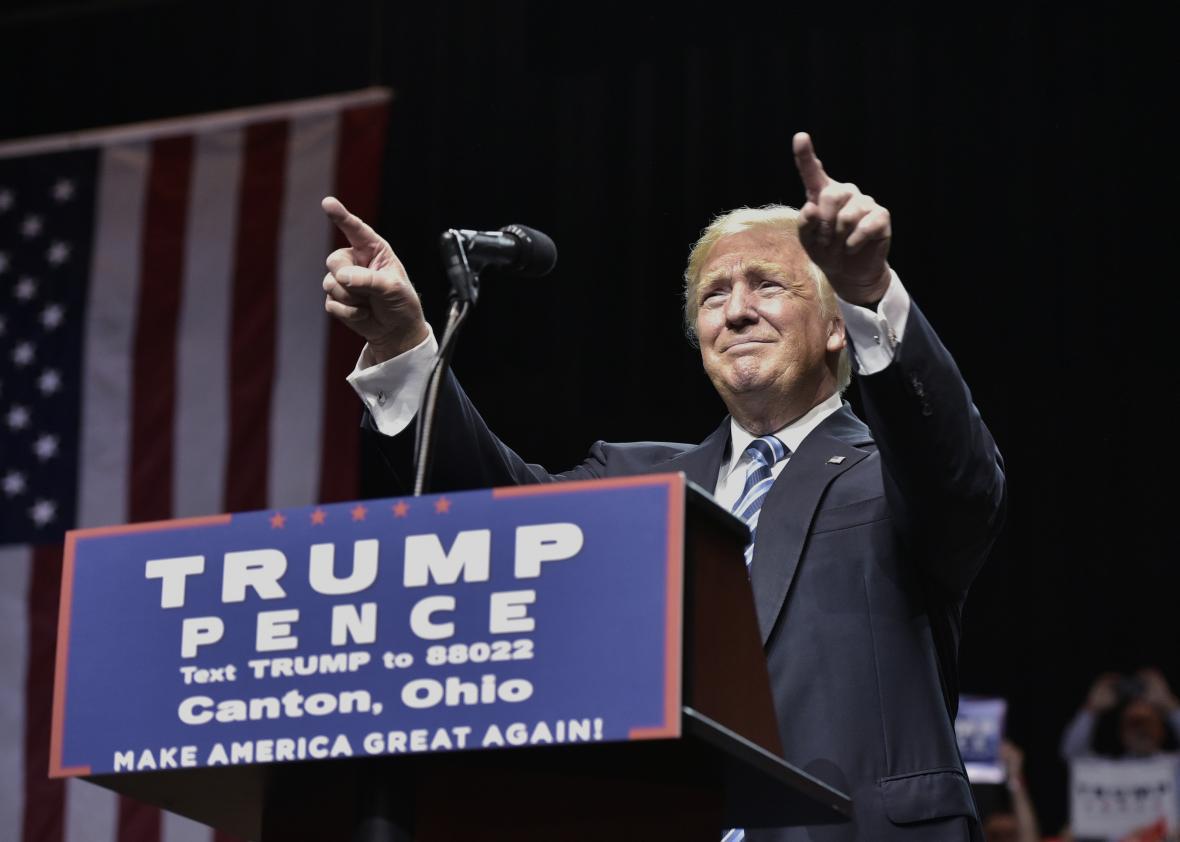How do you know when you’ve really made a name for yourself? Is it when your name is emblazoned in huge letters on gilded buildings? Or when it claims every column inch and chyron scroll? No, it’s when you’ve earned your own adjective: Trumpian, adj., “of or pertaining to Donald Trump.”
Trumpian isn’t exactly complimentary, though Trump may find flattery in the brassy, outsized swagger his adjective connotes. Nor is it new to this presidential election. One early use comes from a 1988 edition of Yachting magazine, which described Dennis Conner’s The Art of Winning as “well within the Trumpian vein.” In 1989, Sports Illustrated observed pleasant, modest communities along the route of the erstwhile Tour de Trump bike race as refreshingly “un-Trumpian.” Many other Trumpian gems bedizen the 1990s and 2000s: retail tumbles, affluent instigators, expense accounts, tabloids, noblesse oblige, conspicuous consumption, comb-overs, debt, and sadistic reality TV culture.
But the word has exploded since Trump launched his White House bid in 2015, of course, thanks to a candidacy and campaign we can only call Trumpian, for the lack of a better—nay, any other—word. And over the past year, its scale has become much grander, not in ritz and glitz but in concept and consequence. Today, we’re labeling language, politics, economics, and, if you’re Hillary Clinton, “outlandish ideas” Trumpian. We’re framing eras and cosmologies as Trumpian. Neo-nativism and misogyny: Trumpian. Disease, narcissism, demagoguery: Trumpian. Trumpian has swelled to Trumpian proportions.
What’s more, Trumpian enjoys some elite company in the lexicon: Many of our greatest philosophers, writers, scientists, and presidents have seen their names made into adjectives. Trumpian hobnobs with Aristotelian ethics. It sips Champagne with Newtonian mechanics. It flies on private jets with Jeffersonian democracy and Dickensian humor. But as the candidate already blitzes our news cycles, Twitter feeds, our every conscious moment, are we sure we want to initiate Trumpian into this sacred pantheon of eponyms? Are we really ready to enshrine it in these storied annals of the English language?
Before we panic, we should note a few key points. The first is a matter of some practical linguistics. We don’t really have much of a choice with Trumpian. A few writers are trying Trumpish. This conjures up, say, trampish and impish, which some may nod at, but our camera-stealing man recedes too much into the background with the wishy-washy -ish. Others are using Trump-esque. Many may assent to the evocations of Kafkaesque, what with its nightmarish illogic and all, yet Trump still feels too brusque for the European élan of -esque. Alternatives to Trumpian appear yet untried—and for good reason. The ending -ic, which wears a fine patina in Homeric and Byronic, sounds clunky and chemical in Trumpic. Again, this is not inapt in the eyes of some critics, but it’s still ill-fitting for the brazen bombast we use Trumpian to call up. So, too, with the slighting, diminutive Trumpy, tempting as it may be.
And so prevails -ian, that Latin-derived suffix English so commonly uses to form adjectives out of proper nouns. The play and punch of word associations aside, there’s actually much more complicated historical and phonetic forces that favor the form Trumpian. Native English speakers—much as we recently saw with “green great dragons”—don’t need explicit instruction to use Trumpian or an explanation for why Trumpic and Trumpy sound off. Owing to the structure and development of English and our deep, subconscious knowledge of its rules, it’s no accident that Trumpian towers over Trumpish and Trump-esque.
But back to the adjectival assuagement: Let’s also not forget that Jungian, Einsteinian, Austenian, Shakespearean, and Washingtonian are giving a few other names the side-eye in their haut monde of modifiers. While so many of the historical and cultural figures lining the halls of English’s eponymous adjectives are positive, there is a exclusive group of AmEx Black cardholders, shall we say: Draconian, Machiavellian, Faustian, Macbethian, Cromwellian, Stalinian, Mussolinian, and, trumping them all, Hitlerian. (The phonology of Putin, alas, would appear to prefer Putinesque.)
Finally, Trump has branded skyscrapers, golf courses, steaks, a brave new world of politics, and his very own adjective, but he longer owns Trumpian. It belongs to the language now, continuing on not in how the epithet-slinging Trump gets to define Trumpian, but in how we, the speakers and writers of the English language, use it. And this is the ultimate irony of Trumpian. As the campaign careens to Election Day, Clinton supporters are frustrated at—and many journalists and historians at a loss to explain—how none of Trump’s intolerance and mendacity seems to stick to the candidate. But those ideas, those actions, so much bigger than any one man, are sticking to his namesake, Trumpian, in all the bluster, braggadocio, and bigotry the adjective has come to name. The success of Trumpian may prove its own Icarian fall.
